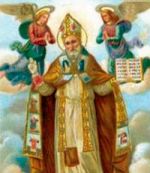Catholic World News News Feature
Pope speaks on St. Paulinus, precursor of Vatican II December 12, 2007
Pope Benedict XVI spoke about St. Paulinus of Nola at his weekly public audience on December 12, remarking that his theological insights were a precursor to the teachings of Vatican II.
Born into a noble family in the middle of the 4th century, Paulinus became governor of Italy's Campania region, but left that post as his faith grew stronger. He and his wife Terasia decided, after the death of their infant child, to form a monastic community dedicated to providing care for the poor. He was eventually ordained a priest and became Bishop of Nola in Italy.
St. Paulinus "left behind him the image of a true pastor of charity," Pope Benedict told his Wednesday audience. He said that the saint, in sharing his wealth with the poor, explained that he was not showing his indifference to worldly goods, "but rather their employment for the most exalted aim: charity."
While he did not write systematic theological works, St. Paulinus did write hymns and poems. These works, the Pope remarked, expressed "the idea of the Church as a mystery of unity." St. Paulinus, the Pontiff continued, spoke regularly of a deep spiritual friendship among believers, which is "a manifestation of the one body of Christ animated by the Holy Spirit."
In short, the poetry of St. Paulinus, written early in the 5th century, expressed an understanding of the Church in terms of communio, the Pope said. "And it is in this concept of communion that theology in our own day has found the key for approaching the mystery of the Church."
The life and work of St. Paulinus, Pope Benedict concluded, "helps us to experience the Church as she is presented to us by Vatican Council II: a sacrament of intimate union with God and of the unity of the whole human race."






